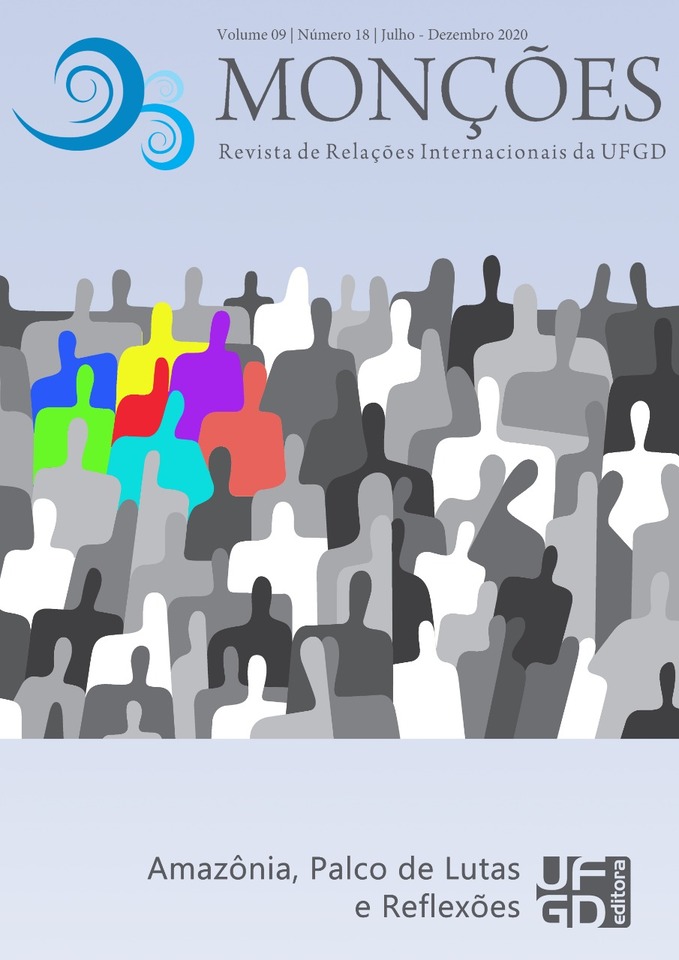Intersectionality and coloniality as interpretive keys: thinking human rights from the Amazon
DOI:
https://doi.org/10.30612/rmufgd.v9i18.12378Keywords:
Intersectionality, Human rights, DecolonialityAbstract
This article starts from the question: "is intersectionality a decolonial option?" to critically reflect on the adequacy of these two interpretative keys to the understanding of Human Rights in peoples of the Americas. The intersectionality theory proposes an analysis of the intercrossing of social markers of gender/race/class. On the other hand, decoloniality presents a historical, political and social context, from which one understands hierarchical beams as colonial inheritances. These interpretive keys bring, in their reflections, ways to understand the selective breach of human rights and deconstruct the systems of hierarchy and power. In this sense, we seek here to point out their limitations and potential.Downloads
References
ANZALDÚA, Gloria. Speaking in tongues: a letter to 3rd world women writers. In: MORAGA, Cherríe; ANZALDÚA, Gloria. This bridge called my back: writings by radical women of color. Watertown: Persephone Press. p. 165-174. 1981
___________. Borderlands/La frontera: the new mestiza. São Francisco: Aunt Lute Books, 2007.
BRAGATO, Fernanda. Discursos desumanizantes e violação seletiva de direitos humanos sob a lógica da colonialidade. Revista Quaestio Iuris. Rio de Janeiro: UERJ. v. 9, n. 4. p. 1806-1823. 2016.
BRAH, Avtar. Diferença, diversidade e diferenciação. Cadernos Pagu. Campinas: Unicamp. n. 26, jan.-jun. p. 329-376. 2006.
CRENSHAW, Kimberle. A intersecionalidade na discriminação de raça e gênero. Em: Painel 1. Cruzamento: raça e gênero. Brasília: Unifem. 2004. Disponível em: http://www.acaoeducativa.org.br/fdh/wp-content/uploads/2012/09/ Kimberle-Crenshaw.pdf. Acesso em: 04 jun. 2020.
___________. Why intersectionality can’t wait. Washington Post, set. 2015.
HIRA, Sandew. A decolonial critique of intersectionality. Decolonial International Network. ago. 2016.
HIRATA, Helena. Gênero, classe e raça: interseccionalidade e consubstancialidade das relações sociais. Revista Tempo Social. São Paulo: USP. v. 26. n. 1. jun. p. 61-73. 2014.
KERGOAT, Danièle. Dinâmica e consubstancialidade das relações sociais. Novos Estudos Cebrap. Ed. 86. v. 29. n.1. mar. p. 93-103. 2010
KUHN, Thomas. A estrutura das revoluções científicas. 5.ª ed. São Paulo: Editora Perspectiva S.A, 1997.
LUGONES, María. Rumo a um feminismo descolonial. Revista Estudos Feministas. Florianópolis: CFH/CCE/UFSC. v. 22. n. 3. set.-dez. p. 935-952. 2014
MIGNOLO, Walter. A colonialidade de cabo a rabo: o hemisfério ocidental no horizonte conceitual da modernidade. Em: LANDER, E. (Org.). A colonialidade do saber: eurocentrismo e ciências sociais. Perspectivas latino-americanas. Buenos Aires: Clacso. p. 71-103. 2005
___________. Desobediência epistêmica: a opção descolonial e o significado de identidade em política. Cadernos de Letras da UFF. Dossiê Literatura, língua e identidade, nº 34, p.287-324, 2008.
___________. Colonialidade. O lado mais escuro da modernidade. Revista Brasileira de Ciências Sociais. Vol. 32. n. 94, 2017.
MOUGEOLLE, Léa. O Conceito de “Interseccionalidade”. Sociologia, jul. 2015. PISCITELLI, Adriana. Interseccionalidade, categorias de articulação e experiências de migrantes brasileiras. Revista Sociedade e Cultura. Goiânia: UFG. v. 11, n. 2. 2008.
RIOS, Flávia; RATTS, Alex. A perspectiva interseccional de Léila Gonzales. Disponível em: http://www.academia.edu/32334342/A_perspectiva_ interseccional_de_Lelia_Gonzalez. Acesso em: 05 jun. 2020.
Downloads
Published
How to Cite
Issue
Section
License
- Os autores e autoras mantêm os direitos autorais e concedem à revista o direito de primeira publicação, com o trabalho simultaneamente licenciado sob a Creative Commons Atribuição-NãoComercial-CompartilhaIgual 3.0 Brasil. que permite o compartilhamento do trabalho com reconhecimento da autoria e publicação inicial nesta revista.
- Autores e autoras têm autorização para assumir contratos adicionais separadamente, para distribuição não-exclusiva da versão do trabalho publicada nesta revista (ex.: publicar em repositório institucional ou como capítulo de livro), com reconhecimento de autoria e publicação inicial nesta revista.
- Autores e autoras têm permissão e são estimulados a publicar e distribuir seu trabalho online (ex.: em repositórios institucionais ou na sua página pessoal) a qualquer ponto antes ou durante o processo editorial, já que isso pode gerar alterações produtivas, bem como aumentar o impacto e a citação do trabalho publicado, porém invariavelmente com o reconhecimento de autoria e publicação inicial nesta revista.


